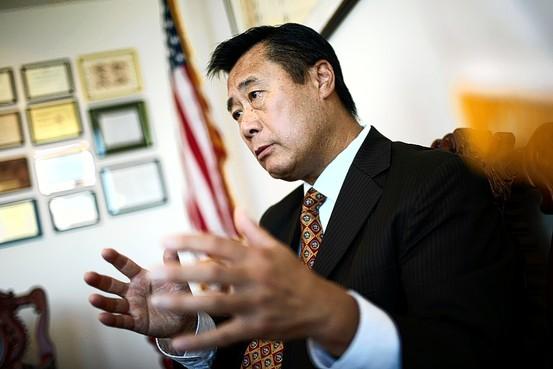
Following Speaker Perez’s halting of SCA5 — a bill that would repeal Prop 209 for institutions of public education in California — from advancement yesterday, SCA5 author State Senator Ed Hernandez has withdrawn the bill, saying that he will examine possible amendments.
Although considering SCA5 did nothing but strike two words — “public education” — from the state constitution, I’m not entirely sure what those amendments might be.
More substantively, Hernandez has vowed to start a state-wide task force to address the issue of affirmative action in higher education, and to combat the profound untruths and misinformation that has characterized the debate over SCA5 in the last few weeks.
Hernandez said he wants to get more positive information out to the public and to dispel what he calls misinformation about SCA 5. To do that, he said he will create a commission of elected officials; experts in constitutional law; community leaders from different ethnic groups; students; parents; and representatives from the UCs, CSUs and community colleges.
The point, he said, is to address concerns opponents have, which might mean amending or even rewriting the proposal.
This turn of events is a positive one, and should provide California voters the tools they need to have the complex, nuanced, and fact-based conversation that the issue of affirmative action deserves. Further, it will permit a conversation that reflects all positions on the topic — particularly, the diverse positions that can be found even within the Asian American community alone.
As many Asian Americans have already asserted, affirmative action in higher education is beneficial to all students including Asian Americans, and Prop 209 has had a profoundly negative effect on underrepresented minorities with virtually no consequent benefit to Asian American admission rates; yet, these facts have been largely unaddressed within the Asian American electorate.
Even Senator Leland Yee (D), one of the three Asian American state senators to first vote for SCA5 and then sign an open letter withdrawing his support, has acknowledged the need to inform the Asian American voter on the damaging effects of Prop 209. As reported in the Pasadena Star News (emphasis mine):
“As lifelong advocates for the Asian American and other communities, we would never support a policy that we believed would negatively impact our children,” the three [Asian American state senators] wrote in a joint letter that was issued last week.
Yee said he supports affirmative action but wants a task force and experts to help Asian-Americans understand why Proposition 209 should be unraveled before referring the matter to voters.
In the end, I am heartened by the call for more education for California voters on this topic. I was drawn into this issue not only because I have been a vocal defender of affirmative action in higher education as it has been threatened in several states, but because as a life-long advocate for Asian Americans who has spent the last decade on this blog encouraging greater political participation, I think it is our responsibility as Asian Americans to engage politics in an informed manner, which means challenging untruths when we see it, and holding our political advocacy groups and news media outlets to unbiased reporting on political topics.
I’m hopeful that this task force idea will be the first step in helping to elevate the debate over affirmative action in California, and look forward to the months ahead when Asian American advocates in favour of campus diversity in higher education can help to further educate on the benefits of affirmative action to the Asian American electorate.
Update: Also, here’s a great article from Julianne Hing over at Colorlines.
There’s unfortunately not much new about the rhetorical stance of SCA-5’s Asian-American opponents. Asian-Americans have been grappling with affirmative action for decades. In the mid-1990s a group of Chinese-American parents whose children were denied admission to Lowell High School, the city’s top public high school, used similar rhetoric when they sued San Francisco Unified School District to successfully undo a federal consent decree at Lowell and dismantle the school’s diversity program. The federal mandate barred any one racial or ethnic group from becoming more than 40 percent of a magnet school’s student body. Then, as now, progressive Asian-Americans called on Chinese-American affirmative action opponents to think past their own community or even their own families’ self-interests, to little avail.
“There is no doubt that Asian-Americans benefitted from the efforts of the blacks during the civil rights movement,” says S.B. Woo, a former lieutenant governor of Delaware and the founder of the conservative Asian-American group 80-20. “Way back five decades ago, maybe some affirmative action is required to get things going because people are not accustomed to seeing colored folks speaking out or having an important position or going to good universities. But five decades later are we still talking about that? It’s time to change.”
The loudest Chinese-American affirmative action opponents have not been shy about voicing thinly veiled anti-black and -Latino sentiments. “Other ethnic groups don’t put their kids’ education as number one priority,” says San Gabriel city council’s Chin Ho Liao. “You don’t realize how much Asian parents sacrifice. Asians are minorities, and even though we’re doing very well, we should be the role model for other minorities. If you punish us for that, that is wrong.”
Those statements don’t sit well with some in the Asian-American community. Today, “Asian-Americans appear ready to make a terrible mistake,” says UC Hastings Law School Dean Frank Wu, “I’m embarrassed by some of the racist rhetoric being offered by so-called Asian-American community leaders.”
